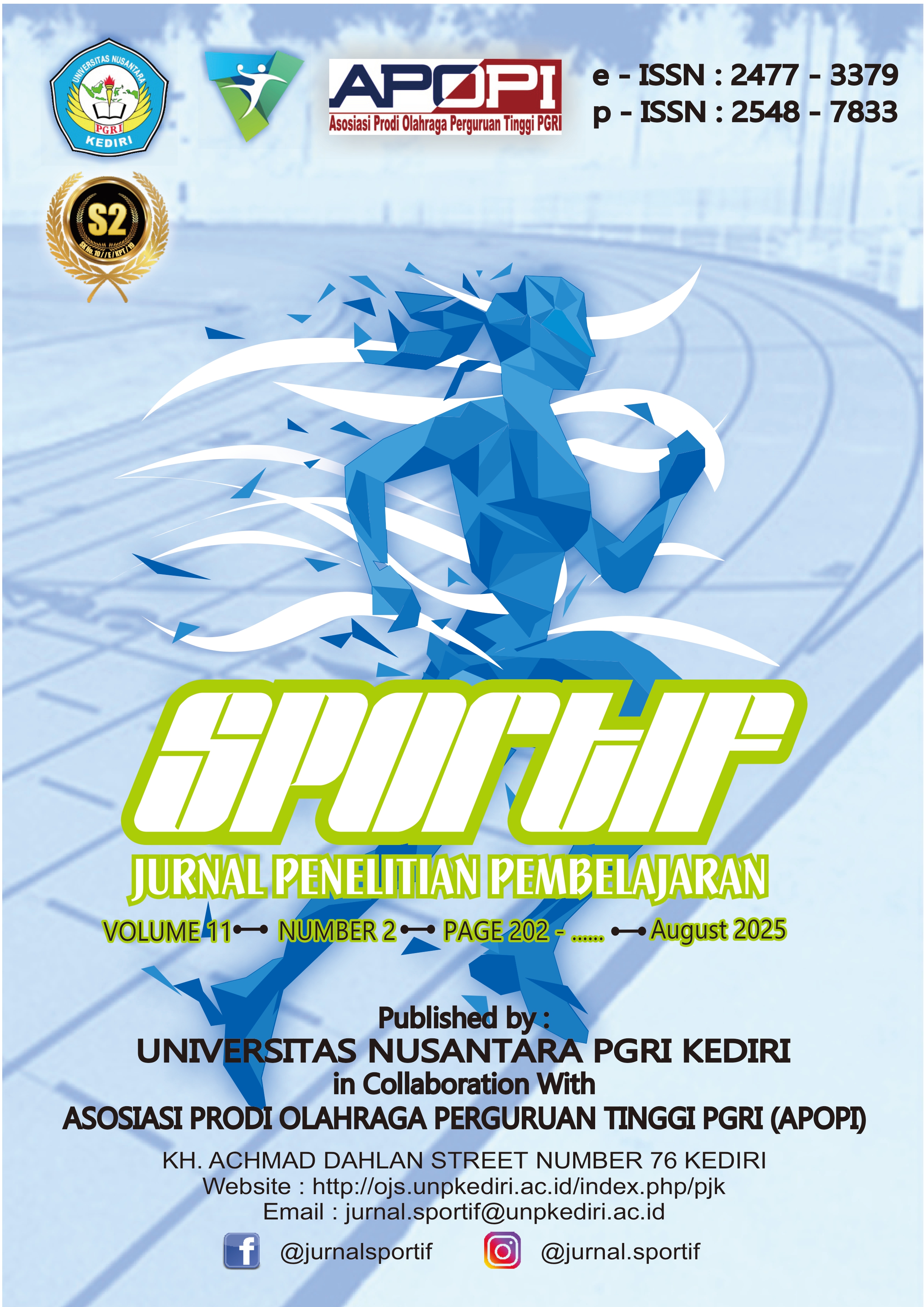Abstract
Dancesport, as a discipline that combines artistic performance and competitive sport, requires technical mastery and strong psychological readiness. Achievement motivation becomes a critical performance determinant, shaped by internal and external factors. This study analyzed the influence of parental support and self-confidence on the achievement motivation of North Sumatra dancesport athletes competing at PON XXI Aceh–North Sumatra 2024. A quantitative approach with an ex post facto survey design was applied. The sample consisted of 10 randomly selected athletes, ensuring that all eligible participants were included in the study. Data were collected using validated Likert-scale questionnaires, and instrument validity was confirmed through expert review, pilot testing, and Cronbach’s Alpha reliability (all > 0.70). Data analysis was conducted using simple and multiple regression with SPSS 26. The results showed that parental support significantly influenced achievement motivation (F = 7.842; p = 0.012), self-confidence also had a significant positive effect (F = 18.074; p = 0.002), and their combination significantly contributed to motivation (F = 6.215; p = 0.028), explaining 64.7% of the variance. These findings conclude that the synergy of external support and internal psychological capital shapes achievement motivation in dancesport. The practical implication is that athlete development programs must integrate parental involvement with structured confidence-building strategies. Theoretically, this study contributes to integrating social support theory and achievement motivation theory in the Indonesian sports context, emphasizing the role of both social and psychological dimensions in athlete development.
References
Ardiansyah, A., Khaldun Sudirman, I., Ichsan Sabillah, M., Alexander Pakpahan, R., & Zarya, F. (2023). The role of parents in supporting sports achievement in football school students in 15 SSB. JORPRES (Jurnal Olahraga Prestasi), 19(2), 157–164. https://doi.org/10.21831/jorpres.v19i2.57610
Blegur, J., & Mae, R. M. (2018). Motivasi berolahraga atlet atletik dan tinju Sport motivation of athletic and boxing athleetes. Jurnal Keolahragaan, 6(1), 29–37. http://dx.doi.org/10.21831/jk.v6i1.16150
Burstiando, R. (2015). Peningkatkan Motivasi Intrinsik dan Ekstrinsik Mel. Jurnal SPORTIF: Jurnal Penelitian Pembelajaran, 1(1), 9–17. https://doi.org/10.29407/js_unpgri.v1i1.571
Dowdell, T. (2013). Achievement goals and motivational climate in competitive gymnastics classes. Science of Gymnastics Journal, 5(2), 53–65. https://doi.org/10.52165/sgj.5.2.53-65
Farradinna, S. (2012). Motivasi Berprestasi Atlet Muda Dalam Menghadapi Pekan Olahraga Nasional Tahun 2012 Ditinjau Dari Kepercayaan Diri. Psikologika : Jurnal Pemikiran Dan Penelitian Psikologi, 17(2), 53–59. https://doi.org/10.20885/psikologika.vol17.iss2.art6
Ferreira, J. G., Rodrigues, F., Sobreiro, P., Silva, M., Santos, F. J., Carvalho, G., Hernández Mendo, A., & Rodrigues, J. (2024). Social support, network, and relationships among coaches in different sports: a systematic review. Frontiers in Psychology, 15(September), 1–9. https://doi.org/10.3389/fpsyg.2024.1301978
Gao, Z., Chee, C. S., Norjali Wazir, M. R. W., Wang, J., Zheng, X., & Wang, T. (2023). The role of parents in the motivation of young athletes: a systematic review. Frontiers in Psychology, 14(January). https://doi.org/10.3389/fpsyg.2023.1291711
Golaszewski, N. M., & Bartholomew, J. B. (2019). The Development of the Physical Activity and Social Support Scale. Journal of Sport and Exercise Psychology, 41(4), 215–229. https://doi.org/10.1123/jsep.2018-0234
Hadiana, O., Wahidi, R., Sartono, S., Agustan, B., & Ramadan, G. (2020). Efektivitas penerapan video feedback (VFB) terhadap motivasi belajar pada pembelajaran futsal. Jurnal SPORTIF : Jurnal Penelitian Pembelajaran, 6(1), 184–198. https://doi.org/10.29407/js_unpgri.v6i1.13831
Hamdani, R. A., & Sartono, H. (2021). Tingkat Percaya Diri Atlet Cabang Olahraga Individual dan Beregu. Jurnal Kepelatihan Olahraga, 13(1), 25–31. https://doi.org/10.17509/jko-upi.v13i1.32307
Harwood, C. G., & Knight, C. J. (2015). Parenting in youth sport: A position paper on parenting expertise. Psychology of Sport and Exercise, 16(P1), 24–35. https://doi.org/10.1016/j.psychsport.2014.03.001
Irawan, Elia, A., & Benius. (2022). Interactive effects of citizen trust and cultural values on pro-environmental behaviors: A time-lag study from Indonesia. Heliyon, 8(3), e09139. https://doi.org/10.1016/j.heliyon.2022.e09139
Jahrir, A. S., & Hasyim, M. Q. (2021). Peran Orang Tua dalam Meningkatkan Prestasi Anak pada Olahraga Senam. Jurnal Dunia Pendidikan, 1(3), 42–46.
Lee, J., Kim, Y., & An, D. (2024). Meta-analysis of the Correlation between Sport Achievement Goal Orientation and Sport Confidence in Korea. The Asian Journal of Kinesiology, 26(3), 10–18. https://doi.org/10.15758/ajk.2024.26.3.10
Lindstrom, K. (2012). Parental Involvement, Pressure, and Support in Youth Sport: A Narrative Literature Review. Journal of Family Theory & Review, 4. https://doi.org/10.1111/j.1756-2589.2012.00129.x
Lourenço, J., Almagro, B. J., Carmona-Márquez, J., & Sáenz-López, P. (2022). Predicting Perceived Sport Performance via Self-Determination Theory. Perceptual and Motor Skills, 129(5), 1563–1580. https://doi.org/10.1177/00315125221119121
Ma’mun, A., Anggorowati, R., Risma, R., Slamet, S., & Anira, A. (2023). An Historical Overview of the Culture of Sports in Indonesia: Global Issues and Challenges for Future Indonesian Sports Development Policies. Asian Journal of Sport History & Culture, 1, 1–22. https://doi.org/10.1080/27690148.2022.2119091
Morais, C., Gomes, A. R., Teixeira, M., & Branco, C. (2025). Athletes’ perspective on parental involvement, motivation, and performance throughout a football season. Journal of Physical Education and Sport, 25(3), 527–538. https://doi.org/10.7752/jpes.2025.03058
Năstase, V. D. (2012). Theoretical Design Definition of Dance Sport. Procedia - Social and Behavioral Sciences, 51(December), 888–890. https://doi.org/10.1016/j.sbspro.2012.08.258
Oguntuase, S. B., & Sun, Y. (2022). Effects of mindfulness training on resilience, self-confidence and emotion regulation of elite football players: The mediating role of locus of control. Asian Journal of Sport and Exercise Psychology, 2(3), 198–205. https://doi.org/10.1016/j.ajsep.2022.08.003
Parahita, Q. D., & Jannah, M. (2022). Penerapan Awareness Training untuk Meningkatkan Self-Confidence Atlet Muda Application of Awareness Training to Increase Self-Confidence in Young Athletes. Jurnal Penelitian Psikologi, 10(01), 38–50. https://doi.org/10.26740/cjpp.v10i1.53343
Safaria, T., Rahayu, Y. P. R., & Rahaju, S. (2024). Adaptasi Skala Parent Child Relationship (IPPA) Versi Indonesia. Journal Psikogenesis, 12(2), 146–161. https://doi.org/10.24854/jps.v12i2.4693
Sari, I., Ekici, S., Soyer, F., & Eskiler, E. (2015). Does self-confidence link to motivation? A study in field hockey athletes. Journal of Human Sport and Exercise, 10(1), 24–35. https://doi.org/10.14198/jhse.2015.101.03
Sholicha, I. F., & W, A. D. (2020). Motivasi Berprestasi Dan Ketangguhan Mental Atlet. PSIKOSAINS (Jurnal Penelitian Dan Pemikiran Psikologi), 15(1), 91. https://doi.org/10.30587/psikosains.v15i1.2004
Standage, M. (2023). Self-Determination Theory Applied to Sport. The Oxford Handbook of Self-Determination Theory, March, 701–723. https://doi.org/10.1093/oxfordhb/9780197600047.013.35
Wang, C. K. J., & Demerin, P. A. G. (2023). Relationship between self-determination theory and flow in the domain of sports and academics among student-athletes. Asian Journal of Sport and Exercise Psychology, 3(2), 114–120. https://doi.org/10.1016/j.ajsep.2023.08.003

This work is licensed under a Creative Commons Attribution-ShareAlike 4.0 International License.
Copyright (c) 2025 Agus Salim, Sefty Malona Sitorus, Ramlan Sahputera Sagala, Ahmad Muchlisin Natas Pasaribu






